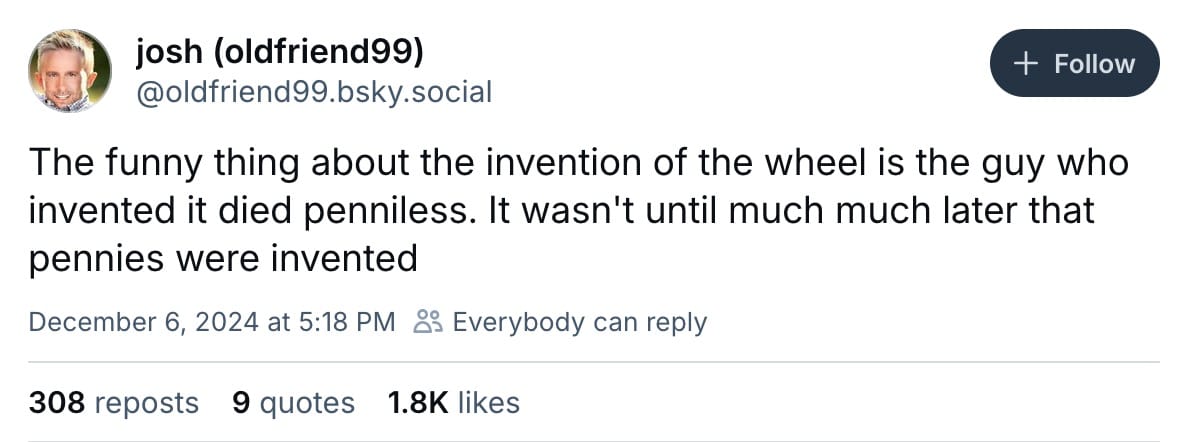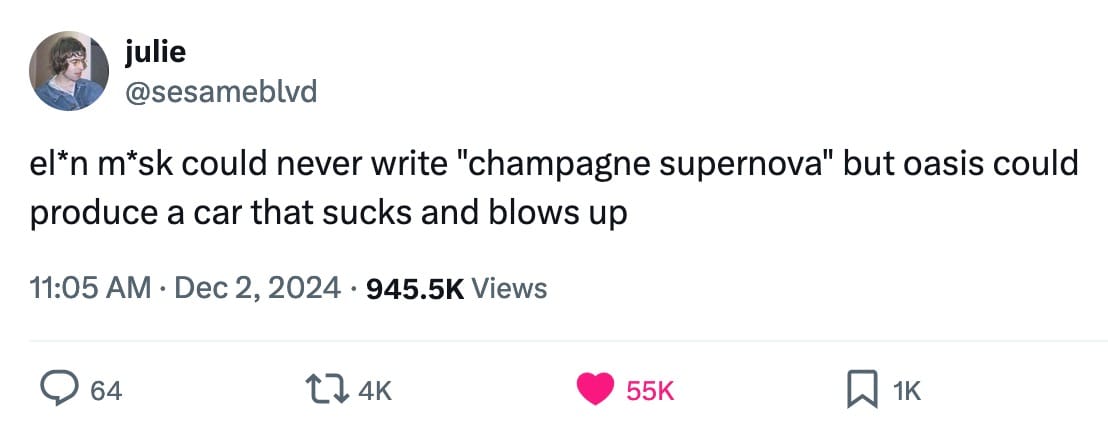Updates from Adam Isacson (December 7, 2024)
Hi, this is Adam. If you're receiving this message, it means you signed up on my website to receive regular updates. If you'd like to stop getting these, just follow the instructions further down.
I hope that U.S. readers had a good Thanksgiving holiday. I enjoyed seeing relatives whom I hadn't seen in a while, and celebrating a big milestone birthday for a close family member the day before the actual holiday. I've got more family coming over for a visit later today. I'm especially grateful for that because work puts me in touch with lots of people whose migratory status, or their inability to return to repressively ruled nations, had separated them from their loved ones for years.
This week's e-mail has the weekly Border Update; an "explainer" and a podcast about Trump already starting to threaten Mexico; some notes on Trump's troubling nominee to head Customs and Border Protection; two pieces about remarkable border and migration data; a CNN Español interview about Colombia; links to some good readings; and links to 10 upcoming Latin America-related events.
If you visit this site a lot, you probably don’t need an e-mail, too. But if you’d like to get more-or-less regular e-mail updates, scroll to the bottom of this page or click here.
Weekly U.S.-Mexico Border Update: Post-Election Migration, Relations with Mexico, Incoming Administration Plans
THIS WEEK IN BRIEF:
Preliminary data indicate that Border Patrol apprehended fewer migrants at the border in November than any month since July 2020. An expected post-election rush, with migrants seeking to get to the United States before Donald Trump’s inauguration, has not happened. In southern Mexico, though, people appear to be arriving in larger numbers and seeking to migrate in large groups.
President-Elect Trump appeared to pull down his November 25 threat to slap tariffs on Mexican and Canadian goods until they stop the entry of migrants and drugs, following a reportedly cordial phone call with Mexican President Claudia Sheinbaum. However, Sheinbaum showed a willingness to push back, disputing Trump’s characterization of what was agreed. A future area of disagreement may be Mexico’s willingness to accept deportations of migrants from third countries.
This section lists several analyses and reports about the incoming administration’s hardline approach to the border and migration. Topics include potential use of the U.S. military, the Texas state government’s crackdown serving as a model or template, the shaky future of alternative migration pathways, and signs that at least some Democrats are moving rightward.
Support ad-free, paywall-free Weekly Border Updates. Your donation to WOLA is crucial to sustain this effort. Please contribute now and support our work.
WOLA Q&A: Trump’s Threats of Tariffs as a Response to Migration and the Fentanyl Overdose Crisis

Here’s a brief piece that WOLA published on December 5 about the aftermath of Donald Trump’s use of tariff threats to bully Mexico on migration and fentanyl. It’s co-authored with my WOLA colleagues Stephanie Brewer (Mexico) and John Walsh (Drug Policy). We also recorded a podcast together.
I wrote the part about migration. An excerpt is below, but I recommend reading the whole thing here.
Mexico’s 2024 crackdown has been its most intense ever. Since January, Mexico has averaged 115,636 blocked or encountered migrants per month—11 times the monthly average during Trump’s first administration. For the first time ever, Mexico’s number has equaled or even exceeded Customs and Border Protection’s (CBP) and Border Patrol’s count of migrants encountered at the border. Mexico cracked down so swiftly that Border Patrol’s migrant apprehensions plummeted 50 percent in a single month, from December 2023 to January 2024: the sharpest month-to-month drop of the 21st century so far. This happened without a mention of tariffs or other punishments.
WOLA Podcast: A Tariff Threat Foreshadows U.S.-Mexico Relations During the Second Trump Presidency

Here’s a WOLA podcast episode recorded Wednesday (December 4) with my WOLA colleagues Stephanie Brewer (Mexico) and John Walsh (Drug Policy). Donald Trump’s crude tariff threat against Mexico and Canada last week tells a lot about what we’ll be dealing with over the next few years. It also showed a possible new side to Mexico’s responses to this sort of bullying. And meanwhile, we need never to lose sight of the absurdity and cruelty of the migration and drug policies that Trump is trying to force on the United States’ closest neighbors.
Here’s the text of the landing page at wola.org. And if you prefer text to audio, check out the brief Q&A explainer that we posted at the same time.
On November 25, President-Elect Donald Trump announced via social media that he would impose a 25 percent tariff on all imports from Mexico and Canada unless migration and fentanyl trafficking ceased entirely. The announcement caused widespread alarm, spurring a flurry of responses and an unclear conversation between Trump and Mexican President Claudia Sheinbaum.
The event was instructive about what we might expect after Trump assumes the presidency in January, WOLA Director for Mexico Stephanie Brewer and Director for Drug Policy John Walsh observe in this episode.
Brewer explained the “tariff threat” incident, how it plays into the political agendas of both Trump and Sheinbaum, and the danger of doing serious damage to a multifaceted, interdependent bilateral relationship.
Host Adam Isacson, who covers border and migration policy at WOLA, joined the discussion to point out that Trump seeks to bully Mexico into carrying out a crackdown on migration that has, in fact, already been underway for some time—with serious human rights implications.
Walsh observed that demands on Mexico to crack down on fentanyl threaten a reversion to supply-side, prohibitionist approaches to a complex drug problem that not only haven’t worked over the past 50 years, but may in fact have ceded much control to armed and criminal groups.
The U.S.-Mexico border, and the bilateral relationship, may be marked by these episodes of threat and bluster for much of the next few years. Weathering this period will require civil society in both the United States and Mexico to play an aggressive role, demanding “steadiness, focus on facts, keeping things grounded in reality,” and never losing sight of what better migration and drug policies would look like.
Download this podcast episode’s .mp3 file here. Listen to WOLA’s Latin America Today podcast on Apple Podcasts, Spotify, iHeartRadio, or wherever you subscribe to podcasts. The main feed is here.
Notes on Trump’s Pick to Head CBP
President-Elect Trump has nominated Rodney Scott as the next commissioner of Customs and Border Protection (CBP), the U.S. government’s leading border security agency, which includes Border Patrol and runs official border crossings from the Mexico border to ports and airports. Scott, a career Border Patrol agent, was chief of the Patrol during the last year of the Trump administration and the first few months of the Biden administration, which dismissed him.
In 2023, I launched a website that tracks allegations of abuse, corruption, and misconduct at U.S. border agencies through an online database. (This project has fallen out of date because it lacks funding—a grant ran out in early 2024. I’m working to convince philanthropic organizations to back the 10-12 expert person-hours per week that its upkeep would require, but I’ve had no luck so far.)
Rodney Scott comes up four times in this database. The often troubling events and allegations are below.
Late November 2021: Rodney Scott, the Trump administration’s last Border Patrol chief who exited his position in August, faced a San Diego Superior Court judge for a September tweet in which he advised former Border Patrol agent turned activist Jenn Budd, who has recounted being raped at the Border Patrol academy, to “lean back, close your eyes, and just enjoy the show.” [On December 6, 2024 Budd wrote on BlueSky, “The judge found that he did make the rape threat, he admitted to hav[ing] CBP open an investigation on me, & I still lost the case.”] Budd also posted screenshots on Twitter showing Scott among those on private CBP and Border Patrol agents’ Facebook groups sharing images of Border Patrol shoulder patches reading “Let’s Go Brandon,” a right-wing euphemism for “F— Joe Biden.”
October 25, 2021: A strongly (and explicitly) worded report from the House of Representatives’ Committee on Oversight and Reform, issued on October 25, detailed the disciplinary process following 2019 revelations of a secret Facebook page at which CBP personnel posted racist, violent, and lewd content (original link). The Committee discovered that for most involved, consequences were light: they “had their discipline significantly reduced and continued to work with migrants” (original link)… “CBP knew about Border Patrol agents’ inappropriate posts on ‘I’m 10-15’ since 2016, three years before it was reported publicly,” the House Committee found. Among the Facebook group’s members were Border Patrol’s last two chiefs, Carla Provost (2018-2020) and Rodney Scott (2020-August 2021). Both indicated that they followed the group in order to monitor agents’ attitudes and complaints.
September 29, 2021: A letter to Justice Department leadership and the DHS Inspector-General from Alliance San Diego alleged that former Border Patrol Chief Rodney Scott, who left his post in August 2021, had violated the Ethics in Government Act. Scott established a consulting firm in July 2021, while still working for Border Patrol. On September 18, he issued a Facebook request for active-duty CBP and ICE personnel to provide information, possibly including restricted information, “to counter the lies and missinformation [sic.] that the DHS Secretary and Biden officials spew everytime they speak about the border.”
January 27, 2021: Relatives of Anastasio Hernández Rojas filed a brief before the OAS Inter-American Human Rights Commission, contending that Border Patrol covered up, and improperly interfered with the investigation of, agents’ role in Hernández’s 2010 death. Video showed numerous Border Patrol agents and CBP officers beating and tasing a hogtied and handcuffed Hernández to death. The brief contended that the acting deputy chief patrol agent in Border Patrol’s San Diego Sector at the time, Rodney Scott, signed a potentially illegal subpoena to obtain Hernández’s autopsy. (Scott went on to be Border Patrol chief from 2020 to 2021.)
In a thread on BlueSky, the CBP Watch coalition posted links to news coverage of additional allegations:
- In June 2018, during the height of the uproar over the Trump administration’s separations of migrant parents and children, Scott told Politico, “I would like to remind people too, what we look at a child in the United States and say, ‘Oh, that 14-year-old young man,’ or, ‘That’s an adult in a lot of other countries. That kid’s been working for years, may or may not have been associated with gangs.’ A lot of times, especially if there’s any kind of a use of force or a violent encounter with law enforcement, and the person’s under 18, people get this picture in their head that it’s like the kid that lives next door to you, and it’s not. Some of these kids are hardened adults, and I’m not going to say that that’s all of them. But look into it, pull the layers of the onion back a little bit more, and you’ll find out most of these stories just are not true. They’re exaggerations.”
- “Scott was chief of Border Patrol when the agency deployed BORTAC”—the agency’s elite, SWAT team-like force—“against protestors in Portland” after the killing of George Floyd in 2020.
- “Scott was also directly implicated in expelling 13,000 unaccompanied children during title 42”—the 2020-2023 policy of removing asylum seekers without an opportunity to seek protection, in the name of pandemic response—“a policy that never got the press scrutiny it deserved (with some honorable exceptions).”
There was no reason not to expect Donald Trump to nominate someone with extremely hardline views to head CBP, someone who may worsen the climate for human rights abuse at an agency that already exhibits serious institutional culture problems. That’s what has happened—and as a career official and a known quantity among the Republican senators who will hold a majority next year, Rodney Scott will probably win confirmation.
I’ll be watching the confirmation closely, along with others in the human rights and government oversight communities. We’ll note how senators vote, and expect at least some to take their oversight role seriously by raising these allegations during the confirmation process. That’s why I’m gathering them all here, to make them available in one place.
Chart: Border Patrol Apprehensions by Country at the U.S.-Mexico Border Since October 2013
I mashed together data from the Department of Homeland Security Office of Homeland Security Statistics and from Customs and Border Protection to make this chart of the past 11 years’ Border Patrol apprehensions of migrants, by country.

Here’s the underlying data table, with statistics from 101 countries (note that OHSS does some rounding to the nearest 10).
A few things about what you see here:
- This is just Border Patrol apprehensions: migrants caught out in the open areas between the official border crossings (ports of entry). I only have CBP port of entry data by country (which is smaller until very recently), for just 21 countries and a big “other” category, going back to October 2019.
- Note how 10 months of the Trump administration (2017-2020) saw more migration than October 2024 (56,530 migrant apprehensions).
- Note how the migrant population was almost completely Mexican, Salvadoran, Guatemalan, and Honduran before the pandemic, and far more diverse after it.
- You can see migration rising in the final months of the Trump administration, as the “Title 42” pandemic expulsions policy ceased to deter people from coming to the border.
- Then, a big jump in migration in early 2021, after Trump left office and the world’s borders reopened several months into the COVID-19 pandemic.
- Then, drop in January 2024 as Mexico’s government, at the Biden administration’s behest, started cracking down harder on migrants transiting the country.
- Then, a further drop in June 2024 as the Biden administration, in a questionably legal move, banned most asylum access between border ports of entry.
- Many observers, including me, expected more migrants stranded in Mexico to rush to the border after Donald Trump won the November 5 election, seeking to get to U.S. soil before Inauguration Day on January 20. That is not happening, at least not yet. It may still happen, and activity is increasing in southern Mexico. Still, as the end-of-year holidays usually bring a lull in migration, it might not happen at all.
Mexico is Already Blocking as Many Migrants as CBP and Border Patrol Are
<Edit, November 27:> It was great talking to Greg Sargent yesterday for an excellent New Republic piece that embeds the below graphic.
All this paves the way for larger deceptions later. Bank on it: The moment Trump takes office, the lower apprehension numbers will magically become real metrics. Fox News will start trumpeting them and he’ll start claiming the border has achieved pacification due to his strength. Indeed, Trump very well may credit his current threat of tariffs with “forcing” Mexico to make the lower numbers of border crossings a reality.
…[W]e may not be prepared for the gale-force agitprop that’s about to hit us.
</Edit>
Yesterday the President-Elect promised to levy tariffs on Mexico and Canada for not doing enough to stop migration to the U.S. border.
However, Mexico’s security and migration forces (green in the chart) are already encountering and impeding, in their territory, about as many migrants as U.S. forces do at the border. In July, they stopped more people than their U.S. counterparts did.

(Mexico hasn’t yet updated its September and October numbers. Underlying numbers are in the image’s alt text.)
CNN Español: “Estados Unidos prohíbe la entrada del General retirado colombiano Mario Montoya”
Here’s a CNN Español segment I recorded at the studio (which is one neighborhood away from home) on the evening of November 25. It’s about State Department sanctioning, for serious human rights allegations, a general who was a key U.S. “partner” at the outset of Plan Colombia in the early 2000s. Also, the Colombian government’s request to pardon a FARC leader currently in the federal Supermax prison in Colorado after being extradited in 2005.
Links From the Past Week
(I'm still catching up with news from Friday, December 6th, an especially busy day. But here's what I've seen.)
- "Behind Bars, Beyond Control: The Fall of Ecuador’s Prisons and the Rise of Its Mafias" (InSight Crime, November 28, 2024).
A package of case studies and visual stories explaining how Ecuador's sudden slide into all-out organized crime violence originated in the country's prisons, which served as mafia incubators.
- Jon Lee Anderson, Javier Milei Wages War on Argentina's Government (The New Yorker, Monday, December 2, 2024).
The veteran journalist spends some time with Argentina's MAGA-aligned president, offering a nuanced view.
- Elizabeth Goitein, Deployment of the U.S. Military for Immigration Enforcement: A Primer (Brennan Center for Justice, Just Security, Tuesday, December 3, 2024).
The folks at the Brennan Center have deep expertise on the legal aspects of using the U.S. military on U.S. soil, as well as other emergency authorities. As the incoming administration plans to use soldiers or guard personnel for "mass deportation" and other domestic duties, explainers like this one are really helpful.
- Oscar Balderas, El Chapo y el Gerald: La Amistad Que Inundo Con Cocaina el Mar (Milenio (Mexico), Sunday, December 1, 2024).
Narrates the transnational alliance between, and parallel rises and falls of, two organized crime figures: Joaquín Guzmán of Mexico's Sinaloa Cartel and Edison Washington Prado Álava, an Ecuadorian specialist in maritime cocaine trafficking.
- Tiziano Breda, ‘Total Peace' Paradox in Colombia: Petro's Policy Reduced Violence, but Armed Groups Grew Stronger (Armed Conflict Location & Event Data Project, Thursday, November 28, 2024).
President Gustavo Petro’s "Total Peace" strategy has reduced violence between security forces and armed groups—but fighting between armed groups has worsened and some groups are strengthening.
Latin America-Related Events in Washington and Online This Week
(Events that I know of, anyway. All times are U.S. Eastern.)
Monday, December 9
- 11:00 at the Atlantic Council and atlanticcouncil.com: Driving smart cities in Latin America and the Caribbean (RSVP required).
Tuesday, December 10
- 9:00-10:30 at the Inter-American Dialogue and thedialogue.org: Political Imprisonment and Human Rights in Latin America and the Caribbean (RSVP required).
- 10:00 in Room G50 Dirksen Senate Office Building and online: Hearing of the Senate Judiciary Committee entitled How Mass Deportations Will Separate American Families, Harm Our Armed Forces, and Devastate Our Economy.
- 10:00-11:30 at thedialogue.org: The Challenges of Artificial Intelligence (AI) to the Rule of Law (RSVP required).
- 10:00-1:00 in Room 310 Cannon House Office Building and online: Hearing of the House Homeland Security Subcommittee on Emergency Management entitled Given the Green Light: Open Border Policies and Threats to Law Enforcement.
- 2:00 in Room 2360 Rayburn House Office Building and online: Hearing of the Tom Lantos Human Rights Commission entitled The State of Exception in El Salvador: Taking Stock.
- 3:00-4:00 at the Wilson Center and wilsoncenter.org: A Latin America Agenda for a New White House and Congress (RSVP required).
Wednesday, December 11
- 9:15-10:30 at the Inter-American Dialogue and thedialogue.org: Women, Financial Inclusion, and Family Remittances in Guatemala (RSVP required).
- 1:00-2:00 at WOLA and wola.org: La Paz Total, El Capitulo Étnico y la Hermandad Afro Americana (RSVP required).
- 2:00 in Room 2200, Rayburn House Office Building and online: Hearing of the House Foreign Affairs Subcommittee on Global Health, Global Human Rights and International Organizations entitled The Communist Cuban Regime’s Disregard for Human Rights.
And Finally




